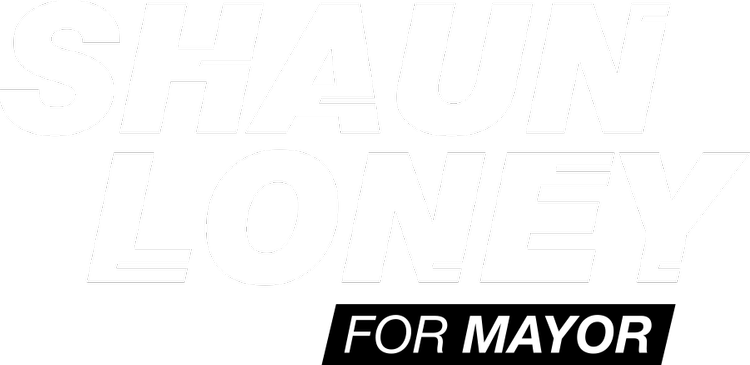Loney Pledges Election Reforms
Future Measures to Promote Financial Transparency and
Limit Political Pandering Exhibited by Murray and Gillingham
Released Oct 25, 2022
Shaun Loney announced today that after being elected Mayor, he will pursue a package of reforms that would come into effect prior to the next municipal election.
The reform measures will ensure transparency and make credible information available to the public before they vote. They are centered on providing timely costing of campaign promises, being straightforward about the actual financial impact for taxpayers and preventing candidates from using large infrastructure projects to curry political favour.
First, the ‘Full Platform Costing Measure’ announced by Loney will seek an amendment to The City of Winnipeg Charter Act. Candidates for Mayor will be required to publish a fully-costed platform BEFORE Winnipeggers begin advanced voting.
“Winnipeggers are tired of politicians making unrealistic promises during a campaign by failing to explain how they will pay for them,” said Loney. “Glen Murray doesn’t help our city by releasing only a partially-costed platform AFTER a record number of Winnipeggers, more than 40,000, have already cast their vote.”
“We need to have a mandatory requirement that each mayoral candidate present not just their claims of what they intend to do if elected, but also how much each promise will cost plus where the money will come from,” stated Loney.
Second, the ‘Property Tax Clarity Measure’ announced by Loney will require more transparency about the impact of increased frontage levies on property tax bills. Loney pledged to:
candidates to disclose the equivalent change in property tax (expressed for a typical house) for any frontage levy adjustments;
rename the existing frontage levy to reflect that it is actually just another property tax; and
modify annual property tax bills to clearly note any increase or decrease as is presently done with utility bills.
Loney cited the record of Scott Gillingham as a prime example of why changes are needed.
“Gillingham has repeatedly voted for significant hikes in the frontage levy to mask an increase in property taxes. His latest proposal for a further 28% jump in the frontage levy for 2023 would result in the highest increase in overall property tax bills in a generation.”
Finally, the ‘Anti-Interference Infrastructure Ranking Measure’ Loney pledged to introduce will minimize political interference in the priority ranking of major infrastructure projects.
Loney observed, “It is obvious that Gillingham is ignoring city policy that proposed major capital projects have a full cost-benefit analysis BEFORE they are deemed a priority. He wants to return to the old, unhelpful practice where individual major infrastructure projects in Winnipeg were decided on exaggerated claims of their benefits and their political advantage.”
As an example, Loney used Gillingham’s proposal to accelerate the Chief Peguis Trail Extension. The project was ranked only 29th in the City of Winnipeg’s 2020 Infrastructure Plan. The $598-million projected capital cost is equivalent to a 7% property tax increase for 30 years.
“Without any supporting evidence or commitments from other levels of government, Gillingham wants to vault his freeway project ahead of dozens of other higher ranked capital projects. Even worse, he has no back-up plan if and when the federal and provincial governments reject his request for hundreds of millions in funding.”
Loney noted that “We can’t afford to properly fix the road system we already have. Scott’s plan will simply add to the problem.”
Speaking at the foot of the 112-year old Louise Bridge, Loney also recited a long list of other crucial infrastructure projects that will need to be delayed or cancelled to fund Gillingham’s plan. They range from replacing and repairing existing bridges and overpasses; improvements to recreation centers and community libraries; building new fire paramedic stations; and building five new rapid transit corridors.”
Loney concluded, “Winnipeggers want each candidate for Mayor to present a realistic plan about how they expect taxpayers to pay for their election promises. That is why I released a detailed, full-costed platform weeks ago with an unprecedented level of disclosure and I am announcing these important additional measures today.”
Backgrounder
Winnipeg Election 2022. Open Democracy Manitoba. Accessed October 25, 2022.
City of Winnipeg 2020 Infrastructure Plan. City of Winnipeg. December 2019.
Strategic Infrastructure Reinvestment Policy Report and Recommendations.
SIRP Task Force. May 15, 1998.Prior frontage levy increases supported by Gillingham: 16% in 2015 and 25% in 2016.
(Source: Assessment and Taxation Statistics. City of Winnipeg. Accessed Oct. 25, 2022.)
Loney applauded the efforts of organizations such as Open Democracy Manitoba’s Winnipeg Election 2022 website, that enable voters to make more informed choices during civic elections.
